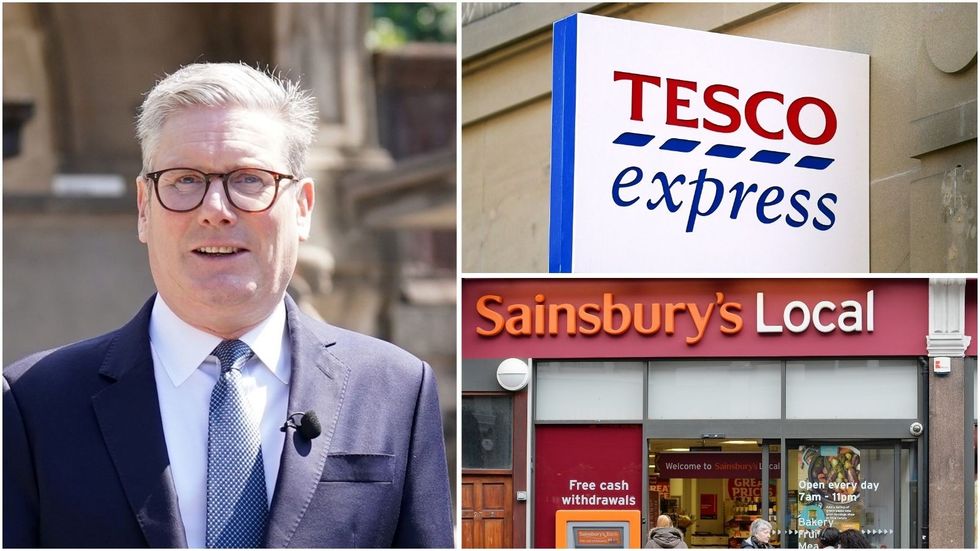Patrick O'Donnell
Guest Reporter
Sir Keir Starmer has mounted a robust defence of the Government's National Insurance hike, declaring he is "absolutely confident" in the Chancellor's financial plans despite mounting pressure from major supermarkets, including Sainsbury's, Tesco and Asda.
Speaking at the G20 summit in Brazil, the Prime Minister insisted the measures were necessary to stabilise the economy and address a £22billion deficit.
Starmer took aim at the previous Conservative administration, stating: "The reason we got into such a mess over the last 14 years is because the last Government refused to take a single difficult decision."
He also criticised Tory leader Kemi Badenoch for wanting "all the benefits of investment in public services" without raising funds to pay for it.
"We've ended that, we've turned the page," Starmer declared, emphasising his commitment to the controversial fiscal measures.
More than 70 major retailers, including Tesco, Asda and Sainsbury's, have warned of inevitable price increases and job losses in an open letter to Rachel Reeves.
Do you have a money story you’d like to share? Get in touch by emailing [email protected].

The letter, coordinated by the British Retail Consortium, highlighted concerns about the Budget's changes to employers' National Insurance contributions.
Retailers acknowledged the Government's focus on improving public services but warned that "the sheer scale of new costs and the speed with which they occur create a cumulative burden".
These changes, which include packaging levies and minimum wage increases, will cost the retail industry £7.06billion annually. The group, which also includes Amazon, Boots, Greggs and Marks & Spencer, has requested a meeting with Reeves to discuss potential adjustments to the timeline of these changes.
They argue this would help businesses adapt and "greatly mitigate their harmful effects on high streets and consumers."
Addressing job loss concerns, Starmer emphasised that difficult Budget decisions were made without impacting workers' take-home pay.
"They will not be paying more (in tax) and they'll see that month on month in their pay slip," he said.
The Prime Minister highlighted protections put in place for employers, particularly smaller businesses. Half of employers will either see no change to their NICs, or they'll be paying less," Starmer explained.
However, the Office for Budget Responsibility has projected that approximately 50,000 jobs could be lost due to the National Insurance contributions increase.
The changes announced by Rachel Reeves in the budget include a £25.7billion adjustment to employers' national insurance contributions, affecting both the tax rate and payment threshold.
Bank of England governor Andrew Bailey has backed retailers' concerns, warning of potential employment risks from the Budget changes.
LATEST DEVELOPMENTS:

"I think there is a risk here that the reduction in employment could be more. Yes, I think that's a risk," Bailey said.
Sainsbury's CEO Simon Roberts warned the tax hikes would lead to higher inflation for shoppers. Asda revealed it would face an additional £100million in costs due to the Budget measures.
The GMB Union, however, strongly criticised the retailers' warnings, with national officer Nadine Houghton calling them "utterly pathetic".
"Multibillion-pound businesses pleading poverty because they're being made to pay more to support public services is utterly pathetic," Houghton said.
She added that many companies are already "subsidised by the taxpayer" through in-work benefits that top up low wages.
Find Out More...
Speaking at the G20 summit in Brazil, the Prime Minister insisted the measures were necessary to stabilise the economy and address a £22billion deficit.
Starmer took aim at the previous Conservative administration, stating: "The reason we got into such a mess over the last 14 years is because the last Government refused to take a single difficult decision."
He also criticised Tory leader Kemi Badenoch for wanting "all the benefits of investment in public services" without raising funds to pay for it.
"We've ended that, we've turned the page," Starmer declared, emphasising his commitment to the controversial fiscal measures.
More than 70 major retailers, including Tesco, Asda and Sainsbury's, have warned of inevitable price increases and job losses in an open letter to Rachel Reeves.
Do you have a money story you’d like to share? Get in touch by emailing [email protected].

The letter, coordinated by the British Retail Consortium, highlighted concerns about the Budget's changes to employers' National Insurance contributions.
Retailers acknowledged the Government's focus on improving public services but warned that "the sheer scale of new costs and the speed with which they occur create a cumulative burden".
These changes, which include packaging levies and minimum wage increases, will cost the retail industry £7.06billion annually. The group, which also includes Amazon, Boots, Greggs and Marks & Spencer, has requested a meeting with Reeves to discuss potential adjustments to the timeline of these changes.
They argue this would help businesses adapt and "greatly mitigate their harmful effects on high streets and consumers."
Addressing job loss concerns, Starmer emphasised that difficult Budget decisions were made without impacting workers' take-home pay.
"They will not be paying more (in tax) and they'll see that month on month in their pay slip," he said.
The Prime Minister highlighted protections put in place for employers, particularly smaller businesses. Half of employers will either see no change to their NICs, or they'll be paying less," Starmer explained.
However, the Office for Budget Responsibility has projected that approximately 50,000 jobs could be lost due to the National Insurance contributions increase.
The changes announced by Rachel Reeves in the budget include a £25.7billion adjustment to employers' national insurance contributions, affecting both the tax rate and payment threshold.
Bank of England governor Andrew Bailey has backed retailers' concerns, warning of potential employment risks from the Budget changes.
LATEST DEVELOPMENTS:
- Inheritance tax alert: Pension savers risk being 'caught in the net' of Reeves's reforms
- Inheritance tax: Six ways to protect your pension pot from Reeves's tax raid
- Reeves told to apologise as Treasury U-turns on 'misleading' National Insurance claim

"I think there is a risk here that the reduction in employment could be more. Yes, I think that's a risk," Bailey said.
Sainsbury's CEO Simon Roberts warned the tax hikes would lead to higher inflation for shoppers. Asda revealed it would face an additional £100million in costs due to the Budget measures.
The GMB Union, however, strongly criticised the retailers' warnings, with national officer Nadine Houghton calling them "utterly pathetic".
"Multibillion-pound businesses pleading poverty because they're being made to pay more to support public services is utterly pathetic," Houghton said.
She added that many companies are already "subsidised by the taxpayer" through in-work benefits that top up low wages.
Find Out More...